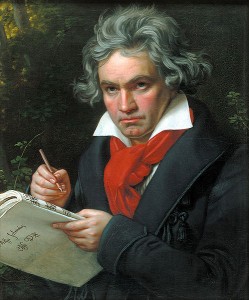Nancy and I went to Symphony Center at 6:30 for a pre-concert performance of Ludwig van Beethoven’s String Trio in D Major, Op. 9, No. 2 played by three members of the Orchestra, Qing Hou, violin, Lawrence Neuman, viola, and Brant Taylor, cello. I’m not a big fan of chamber music, but enjoyed this pretty well.

Joseph Karl Stieler (1781–1858): Portrait of Ludwig van Beethoven when composing the Missa Solemnis (1820)
After the trio, Lawrence Rapchak, music director of the Northbrook Symphony gave a presentation on the evening’s program. He spent the most time on Beethoven’s Symphony No. 5 in D Minor, Op. 67, but also talked about the Symphony No. 8 in F Major, Op. 93 and the Overture to Fidelio. He went through the symphonies, talking about the musical elements and structure, playing themes on the piano or playing excerpts from orchestra performances. His delivery was quick, lively and very interesting. It was perhaps the best and most helpful talk I’ve ever heard about music, especially among the pre-concert talks. I would love to hear more by him.
Nancy and I enjoyed the program conducted by 81-year-old Bernard Haitink. I think my enjoyment and understanding were enhanced by the Rapchak presentation. I heard more and noticed more. It was a memorable evening.
